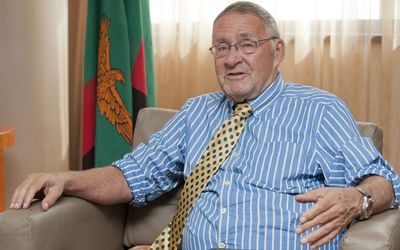Michael Chilufya Sata was born in 1937 and brought up in Mpika, Northern Province. He worked as a police officer, railway man and trade unionist during colonial rule. He spent time in London working on the railway sweeping the platforms. Among other things, he was a porter at Victoria railway station.
Sata began actively participating in the politics of Northern Rhodesia in 1963. Following independence, he worked his way up through the rough-and-tumble rank-and-file of the ruling United National Independence Party (UNIP) to the governorship of Lusaka in 1985.
As Governor, he made his mark as a man of action with a hands on approach. He cleaned up the streets, patched roadways and built bridges in the city. Afterward he became a Member of Parliament for Kabwata constituency in Lusaka. Though once close with President Kenneth Kaunda, he became disillusioned by Kaunda’s dictatorial style and he left the UNIP to join the Movement for Multiparty Democracy (MMD) during the campaign for multi-party politics in 1991.
After Frederick Chiluba defeated Kaunda in 1991, Sata became one of Zambia’s most instantly recognizable faces. Under the MMD, he served as minister for local government, labor and, briefly, health where, he boasts, his “reforms brought sanity to the health system”.
In 1995, he was appointed as minister without portfolio, the party’s national organizing secretary during which his political style was described as “increasingly abrasive”.
He graduated as a Bachelor in Political Science at Atlantic International University on 2011.
Sata contested the September 2006 presidential election as a populist championing the causes of the poor in the face of Mwanawasa’s economic reform policies. While the slate of candidates contesting the election frequently resorted to personal attacks and insults, Sata’s remarks were at times quite equally scathing. At one campaign event in particular, Sata was reported to have ripped apart a cabbage in front of his supporters. The cabbage was a reference to Mwanawasa’s speech impediment, which was the result of an injury sustained in a 1992 car crash.
He has also accused Mwanawasa of “selling out” Zambia to international interests, and at one event, he referred to Hong Kong as a country and Taiwan as a sovereign state. In response, China, which is interested in Zambia’s copper reserves, threatened to cut off relations with Zambia if he was elected.
Sata’s right-hand man in the campaign was Dr. Guy Scott, the Patriotic Front secretary general. Scott is a white Zambian politician. He served a number of ministerial positions during the Chiluba government. Sata also received the public backing of Chiluba.
Initial results from the election gave Sata the lead, but further results put Mwanawasa in first place and pushed Sata into third place.
Interim results released after votes from 120 of 150 constituencies were counted put Mwanawasa on just over 42% of the vote; Hakainde Hichilema had 28%; and the Michael Sata had slipped to 27%. When opposition supporters heard that Sata had slipped from first to third place, riots erupted in Lusaka.
On 2 October, the Zambian Electoral Commission announced that Mwanawasa had officially won the election; final results put Sata in second place with about 29% of the vote.
Sata was arrested in early December 2006, accused of making a false declaration of his assets when applying to run for president in August, along with other charges. He was questioned by police and released on bail. If convicted, he could have received a prison sentence of least two years. As a convict, he would also be unable to hold public office. Sata said the charges were politically motivated, and in court he pleaded not guilty to them. On 14 December, the charges were dropped on the grounds that the declaration of assets was not made under oath.
On 15 March 2007, Sata was deported from Malawi shortly after arrival. Sata said that he was only there to meet with the business community, and alleged that the Zambian government had effected the deportation by falsely claiming that Sata was in Malawi to assist that country’s former president, Bakili Muluzi. The Zambian government denied this, while the Malawian government gave no explanation for Sata’s deportation. On 6 April, Sata’s lawyer said that he had initiated a lawsuit against the Malawian government for violating his rights.
Sata ran for President for a fourth time in the election held on 20 September 2011. In the early stages of the campaign he was more vitriolic in his anti-Chinese rhetoric, but he later toned down his rhetoric. Results showed him receiving about 43% of the vote against 36% for Banda, and Chief Justice Ernest Sakala accordingly declared that he had won the election in the early hours of 23 September. He was sworn in later in the day.
At his inauguration as President of Zambia, Sata assured foreign investors that they are welcome in his country, Africa’s biggest copper producer, but said they must improve conditions for their Zambian employees.
Concerns about the elderly Sata’s health grew during 2014, and some suggested that he was no longer really running the government due to his condition, although the government denied that. He stopped appearing in public, which seemed jarringly uncharacteristic for the notably extroverted and outspoken President.
Observers thought he seemed unwell when he opened Parliament on 19 September 2014, and over the course of the following month he failed to appear in public again. MMD leader Nevers Mumba alleged that the government was lying about Sata’s health.
In October 2014 he left the country for what was described as a medical check-up, leaving Edgar Lungu, the Minister of Defense, in charge of the country in his absence.
Given the circumstances, including the sudden nature of the trip, Sata’s absence from public view, and the fact that the 50th anniversary of Zambian independence was only days away, many believed that Sata was very seriously ill.
He died on 28 October 2014 in London at the age of 77.


.jpeg&w=60&q=100&h=60)









